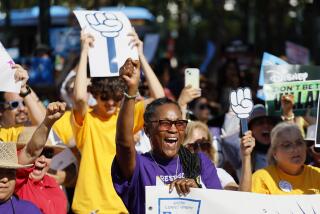Low Turnout Called ‘Slap in the Face’ to Premier : French Back New Caledonia Peace Plan
- Share via
PARIS — French voters Sunday approved a 10-year peace plan for the South Pacific territory of New Caledonia, where white settlers and Melanesian separatists have been involved in a bloody ethnic conflict since 1984. Opposition political leaders charged that the record-low turnout for the referendum, which grants limited autonomy to the archipelago until a vote for independence scheduled for 1998, was a “slap in the face” to the Socialist government of Premier Michel Rocard.
Nearly 80% of those voting supported the peace agreement that Rocard personally brokered in June between leaders of rival Melanesians, known locally as Kanaks, and the mostly white settlers, called Caldoches. However, a record 62% of eligible French voters failed to go to the polls.
The Gaullist Rally for the Republic party had called for voters to abstain from voting in the referendum, the seventh national vote in France in the last six months. “The referendum was a fiasco,” the party’s president, Alain Jupe, said Sunday night, “and the results were a slap in the face to the government.”
Rocard admitted that the turnout was “weak.” But he said the favorable vote heralds “10 years of peace and 10 years of the chance for development in New Caledonia.”
Both Rocard and President Francois Mitterrand had made personal appeals for voters to support the agreement as a symbol of fraternity and justice on the islands, where the population of 145,000 is divided among the native Melanesians, the fiercely pro-French Caldoches and an Asian population that generally sides with the pro-French elements.
TV Ads Unsuccessful
A series of television advertisements, including one that featured a poster of Marilyn Monroe, attempted unsuccessfully to steer the French to the polls. France has controlled the island chain, 1,000 miles east of Australia, since 1853. But since 1984, violent clashes between the two main groups on the islands, the Melanesians and the Caldoches, have become increasingly frequent, resulting in more than 40 deaths.
The archipelago is currently under direct control of France, which gives it an annual subsidy of more than $350 million and pays the wages of 5,000 civil servants and 7,000 soldiers and police on the island.
Under terms of the referendum, the territory would be divided into three provinces with provincial governments by next summer.
While the vote in favor of the government-sponsored referendum was lopsided in mainland France, it was much closer in New Caledonia. There, 57% of the voters favored the agreement and 42% opposed it.
Significantly, the vote against the referendum was highest (63%) in the largest city of Noumea, dominated by the white settlers.
The high negative vote in Noumea was a personal setback for Jacques Lafleur, 56, the Noumea mayor and Caldoche leader who signed the agreement with Melanesian leader Jean-Marie Tjibaou, 52, a former priest.
More to Read
Sign up for Essential California
The most important California stories and recommendations in your inbox every morning.
You may occasionally receive promotional content from the Los Angeles Times.













